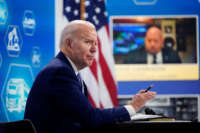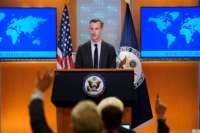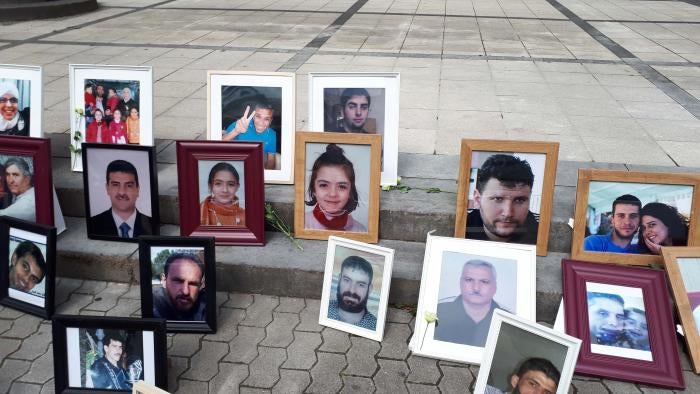
Speaking at a New Hampshire campaign event in 2019, then-presidential candidate Joe Biden told the crowd, “We don’t need more nuclear weapons, period.” After the bluster and apocalyptic theatrics of Donald Trump, many voters hoped Biden’s decades of nuclear arms control experience would bring restraint and stability to the United States’ nuclear policies.
In Biden’s own words, “If you want a world without nuclear weapons, the United States must take the initiative to lead the world,” and yet, one year into his presidency, Biden has continued many of the nuclear weapons programs that began or advanced under Trump.
Currently, the U.S. is pursuing a nuclear weapons modernization program that was launched by the Obama-Biden administration that is expected to cost at least $1.7 trillion by 2046. This includes large spending increases on a controversial low-yield smaller nuclear warhead, the total replacement of the intercontinental ballistic missile force, new B-21 strategic bombers, B-52 upgrades, more destructive nuclear warheads, as well as other programs.
Additionally, on December 27, Biden signed into law the 2022 National Defense Authorization Act, a nearly $770 billion military bill that includes almost $28 billion for nuclear weapons. As of September 2020, the U.S. had a total inventory of 5,600 stockpiled nuclear warheads which, together with Russia, represent approximately 91 percent of the world’s nuclear weapons.
Below, eight analysts, activists and nuclear specialists offer Truthout their assessment of Biden’s first year of nuclear policies.
Increased Transparency
Compared to his predecessor, Biden has been more transparent in disclosing nuclear budget, stockpile and dismantlement figures, says Hans Kristensen, director of the Nuclear Information Project at the Federation of American Scientists. For his increased transparency, the extension of a major arms treaty, and for initiating strategic talks with Russia and China, Kristensen gives Biden a grade of “B.”
With respect to the incomplete disclosure and slowing rate of dismantling retired nuclear warheads, however, he gives Biden a “C.” Furthermore, he’s concerned Biden’s forthcoming Nuclear Posture Review might not adopt a no-first-use nuclear weapons policy.
“[Biden’s] general military strategy and foreign policy are beefing up offensive capabilities and posturing in response to Russia and China,” Kristensen told Truthout. “Many see that as necessary to deter those countries, but it may also work to stimulate their activities further.”
Saving New START
On the plus side, Biden earned widespread praise for extending the New START Treaty, which limits U.S.- and Russian-deployed long-range nuclear weapons, before it was set to expire two weeks into his presidency. Daryl Kimball, executive director of the Arms Control Association, called the extension an “important and common-sense step.” John Tierney, a former congressman and executive director of the nonprofit Council for a Livable World, described the treaty’s extension as “one bright spot” in Biden’s first year, which he said was a “serious disappointment” otherwise.
“On the whole, the Biden administration has rubber-stamped every major big-budget nuclear weapons system produced under the Trump administration,” Tierney told Truthout. He further criticized Biden for failing to miss “low-hanging fruit,” including opportunities to cancel a new “unnecessary and wasteful” submarine-launched ballistic missile nuclear warhead, a life-extension program for the outdated B-83 megaton gravity bomb, and “more useable” nuclear weapons.
“At the moment,” Tierney said, “We must give [Biden] a ‘C-minus’ — a passing grade, but only barely.”
Grassroots movement Beyond the Bomb’s executive director, Cecili Thompson Williams, told Truthout that even though Biden has stated support for a no-first-use policy, a more rational nuclear posture has not been a Biden administration priority.
“Without that leadership, nuclear hawks at the Department of Defense are once again succeeding in their resistance to common-sense changes to make our nuclear policy safer,” Thompson Williams said. Also giving Biden a “C-minus,” she called his first year “disappointing but with potential to improve.”
In September, 29 members of Congress wrote to Biden to implore him to reduce excessive spending and over-reliance on nuclear weapons. This was followed by a letter to the president sent in December and signed by almost 700 scientists and engineers calling for a reduction in the role of nuclear weapons in U.S. national security.
In Search of Strategic Stability
When Biden became president one year ago, he inherited four major international nuclear challenges: Russia, China, North Korea and Iran. Vowing to rejoin the Joint Comprehensive Plan of Action, better known as the Iran nuclear deal, from which Trump unilaterally withdrew in 2018, Biden said the U.S. was “prepared to return to full compliance if Iran does the same.”
Assal Rad, a senior research fellow with the National Iranian American Council, tells Truthout that despite high hopes that Biden would reverse Trump’s actions which helped drive the U.S. and Iran dangerously close to all-out war in 2019-20, in many ways, the Biden administration has continued the Trump administration’s “maximum-pressure” policy.
The continuation of sanctions that are devastating Iran’s citizens and its economy, Rad says, has only hindered efforts to revive the deal. She criticizes Biden for failing to act swiftly during the window of opportunity he had in his first five months as president to seek progress with Iran’s previous, more engagement-friendly Hassan Rouhani administration before staunch conservative Ebrahim Raisi was elected in June.
“The Biden administration now finds itself in a much more challenging position to restore the deal,” Rad said. “Now, more than ever, we need diplomatic resolutions to global issues and an even-handed approach on nuclear proliferation.” On Biden’s Iran nuclear policy, Rad gives the president a “C” for not “succeeding to accomplish anything but not yet entirely failing by escalating tensions further.”
A Dangerous Status Quo
After whiplash diplomacy in which Trump threatened to “totally destroy North Korea,” only to later fawn over “beautiful letters” he received from Kim Jong Un, Northeast Asia analysts were hopeful the Biden administration would lead to a less erratic, more substantive phase of nuclear diplomacy.
Although Biden said he shares South Korean President Moon Jae-in’s stated goal of “complete denuclearization of the Korean Peninsula,” Christine Ahn, executive director of Women Cross DMZ, tells Truthout, “much of this is rhetoric,” and the Biden administration has not changed what she called the “failed policies of sanctions, military exercises and the travel ban.”
“The U.S. will continue these militaristic policies until North Korea makes progress on denuclearization, which won’t happen as long as the U.S. continues its hostile policies,” Ahn said. She gives Biden a grade of “D” because “he hasn’t done anything to improve relations with North Korea [including declaring an end to the Korean War], which will be pivotal to advance denuclearization.”
Strategic Stability
After Russia and the U.S., China is the third-largest nuclear weapons state. While China is expanding its nuclear capabilities, its arsenal remains a fraction of the other two countries. Tong Zhao, a senior fellow at the Nuclear Policy Program of the Carnegie Endowment for International Peace, tells Truthout that Biden understands the importance of direct engagement on nuclear matters with China’s President Xi Jinping.
Writing from Beijing, Zhao noted that Biden achieved “some success” by prompting Xi to acknowledge the importance of discussing strategic stability at their first virtual meeting in November, something Xi previously did not acknowledge.
In its broadest sense, Zhao said, “strategic stability” refers to the maintenance of generally stable bilateral [U.S.-China] relations. More narrowly, it refers to a stable nuclear relationship by mitigating a nuclear arms race or the use of nuclear weapons.
Zhao called the Biden administration’s nuclear policymaking “pragmatic” for his willingness to start with less-difficult issues such as crisis prevention and confidence-building measures. Zhao gives Biden an “A-minus.”
The Good, the Bad and the Incomplete
Arms Control Association Executive Director Daryl G. Kimball, told Truthout that Biden’s first year of nuclear policy has been a mix of good (New START); bad (an enormous nuclear budget); and incomplete or mixed (Iran, North Korea). “It’s not a simple answer that can be boiled down to a letter grade,” Kimball said.
In July, the association published an issue brief which details why Biden’s 2022 nuclear budget is “very unhelpful,” what Kimball described as an “excessive and extremely costly plan to upgrade all major aspects of the nuclear weapons arsenal.” Exactly what the role and purpose of nuclear weapons is in Biden’s national security strategy will be detailed in the forthcoming Nuclear Posture Review, expected in early 2022.
“The jury is still out on whether the president will follow through on his pledge during the campaign, and in his interim national security strategy, to reduce the role of nuclear weapons and to restore U.S. leadership on nuclear arms control and disarmament,” Kimball said. “I have my deep concerns about whether this Nuclear Posture Review will do that.”
The one area where Kimball gives Biden an “F” is for his failure to speak about the importance of reducing growing nuclear competition and the need to pursue a world without nuclear weapons. “I think it’s a failure of leadership in his first 12 months not to have delivered a major or even a minor policy speech on the subject,” Kimball said.
If Biden choses to do so, he can change that when the Review Conference of the Parties to the Treaty on the Non-Proliferation of Nuclear Weapons commences in New York on January 4.
Nuclear Weapons Are Now Illegal
One of the most notable nuclear developments of Biden’s first year in office occurred just two days after he was sworn in as president. On January 22, the United Nations Treaty on the Prohibition of Nuclear Weapons (TPNW) entered into force, making nuclear weapons illegal under international law. Adopted and ratified by at least 58 countries, the U.S. and the other eight nuclear-weapons-possessing nations oppose the ban.
As Arms Control Association’s Kimball points out, the TPNW contributes to a common goal shared by nuclear-armed states and non-nuclear-armed states, which is the pursuit of a world without nuclear weapons. The TPNW also reinforces the taboo against the possession and use of nuclear weapons.
Beatrice Fihn, executive director of the International Campaign to Abolish Nuclear Weapons, notes that when Biden took office, he inherited a disarmament situation that was “in tatters,” but says the TPNW created a bright spot. “Instead of embracing this, the Biden administration has aggressively attacked the TPNW and relentlessly pressured allies to abandon the treaty.”
Biden’s disarmament policy, Fihn told Truthout, is a “D-minus” — “not the leadership that can save us from nuclear disaster.”
This post was originally published on Latest – Truthout.








